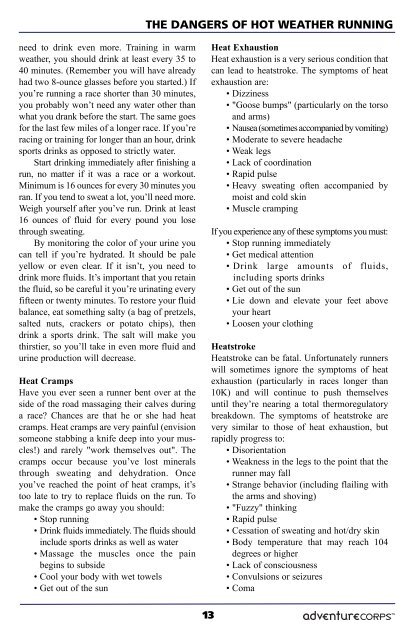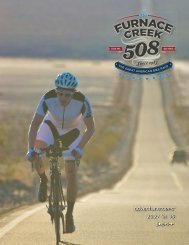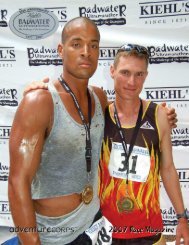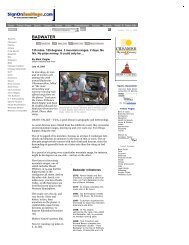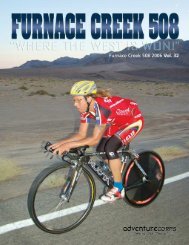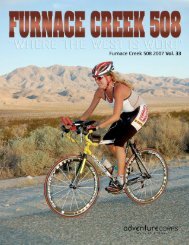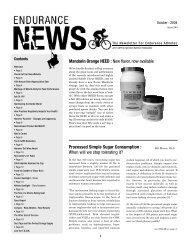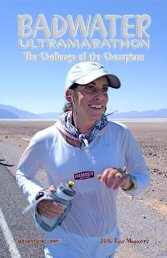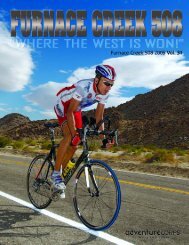Race Magazine - AdventureCORPS
Race Magazine - AdventureCORPS
Race Magazine - AdventureCORPS
You also want an ePaper? Increase the reach of your titles
YUMPU automatically turns print PDFs into web optimized ePapers that Google loves.
THE DANGERS OF HOT WEATHER RUNNING<br />
need to drink even more. Training in warm<br />
weather, you should drink at least every 35 to<br />
40 minutes. (Remember you will have already<br />
had two 8-ounce glasses before you started.) If<br />
you’re running a race shorter than 30 minutes,<br />
you probably won’t need any water other than<br />
what you drank before the start. The same goes<br />
for the last few miles of a longer race. If you’re<br />
racing or training for longer than an hour, drink<br />
sports drinks as opposed to strictly water.<br />
Start drinking immediately after finishing a<br />
run, no matter if it was a race or a workout.<br />
Minimum is 16 ounces for every 30 minutes you<br />
ran. If you tend to sweat a lot, you’ll need more.<br />
Weigh yourself after you’ve run. Drink at least<br />
16 ounces of fluid for every pound you lose<br />
through sweating.<br />
By monitoring the color of your urine you<br />
can tell if you’re hydrated. It should be pale<br />
yellow or even clear. If it isn’t, you need to<br />
drink more fluids. It’s important that you retain<br />
the fluid, so be careful it you’re urinating every<br />
fifteen or twenty minutes. To restore your fluid<br />
balance, eat something salty (a bag of pretzels,<br />
salted nuts, crackers or potato chips), then<br />
drink a sports drink. The salt will make you<br />
thirstier, so you’ll take in even more fluid and<br />
urine production will decrease.<br />
Heat Cramps<br />
Have you ever seen a runner bent over at the<br />
side of the road massaging their calves during<br />
a race? Chances are that he or she had heat<br />
cramps. Heat cramps are very painful (envision<br />
someone stabbing a knife deep into your muscles!)<br />
and rarely "work themselves out". The<br />
cramps occur because you’ve lost minerals<br />
through sweating and dehydration. Once<br />
you’ve reached the point of heat cramps, it’s<br />
too late to try to replace fluids on the run. To<br />
make the cramps go away you should:<br />
• Stop running<br />
• Drink fluids immediately. The fluids should<br />
include sports drinks as well as water<br />
• Massage the muscles once the pain<br />
begins to subside<br />
• Cool your body with wet towels<br />
• Get out of the sun<br />
Heat Exhaustion<br />
Heat exhaustion is a very serious condition that<br />
can lead to heatstroke. The symptoms of heat<br />
exhaustion are:<br />
• Dizziness<br />
• "Goose bumps" (particularly on the torso<br />
and arms)<br />
• Nausea (sometimes accompanied by vomiting)<br />
• Moderate to severe headache<br />
• Weak legs<br />
• Lack of coordination<br />
• Rapid pulse<br />
• Heavy sweating often accompanied by<br />
moist and cold skin<br />
• Muscle cramping<br />
If you experience any of these symptoms you must:<br />
• Stop running immediately<br />
• Get medical attention<br />
• Drink large amounts of fluids,<br />
including sports drinks<br />
• Get out of the sun<br />
• Lie down and elevate your feet above<br />
your heart<br />
• Loosen your clothing<br />
Heatstroke<br />
Heatstroke can be fatal. Unfortunately runners<br />
will sometimes ignore the symptoms of heat<br />
exhaustion (particularly in races longer than<br />
10K) and will continue to push themselves<br />
until they’re nearing a total thermoregulatory<br />
breakdown. The symptoms of heatstroke are<br />
very similar to those of heat exhaustion, but<br />
rapidly progress to:<br />
• Disorientation<br />
• Weakness in the legs to the point that the<br />
runner may fall<br />
• Strange behavior (including flailing with<br />
the arms and shoving)<br />
• "Fuzzy" thinking<br />
• Rapid pulse<br />
• Cessation of sweating and hot/dry skin<br />
• Body temperature that may reach 104<br />
degrees or higher<br />
• Lack of consciousness<br />
• Convulsions or seizures<br />
• Coma<br />
13


